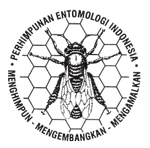Pengaruh ekstrak kemangi (Ocimum basilicum forma citratum) terhadap perkembangan lalat rumah (Musca domestica) (L.)
DOI:
https://doi.org/10.5994/jei.5.1.36Keywords:
larvacidal, house fly, Ocimum basilicum forma citratum.Abstract
Effect of Kemangi Extract (Ocimum basilicum forma citratum) to House Fly (Musca domestica) (L.). The aim of this study was to know larvacidal effect of basil leave on house fly (Musca domestica ). Using atsiri oil which extracted through the steam distillation procedure, this study applied 5 treatments and 4 replications. The treatment were 2.5, 5, 10, and 20% asitri oil dilluted on water compared to control (water only, 0%), The study showed that 20% dilluotion has highest larvacidal effect, cause highest mortality rate (83%), and inhibited ecdysis shown by lowest ecdysis and enclosy ability sharing only 13 and 37%.Downloads
Download data is not yet available.
Downloads
Published
2017-02-23
How to Cite
H, D. I., Gunandini, D. J., & Kardinan, A. (2017). Pengaruh ekstrak kemangi (Ocimum basilicum forma citratum) terhadap perkembangan lalat rumah (Musca domestica) (L.). Jurnal Entomologi Indonesia, 5(1), 36. https://doi.org/10.5994/jei.5.1.36
Issue
Section
Articles
License
Authors who publish with this journal agree to the following terms:
- Authors retain copyright and grant the journal right of first publication with the work simultaneously licensed under a Creative Commons Attribution 4.0 International License that allows others to share the work with an acknowledgement of the work's authorship and initial publication in this journal.
- Authors are able to enter into separate, additional contractual arrangements for the non-exclusive distribution of the journal's published version of the work (e.g., post it to an institutional repository or publish it in a book), with an acknowledgement of its initial publication in this journal.
- Authors are permitted and encouraged to post their work online (e.g., in institutional repositories or on their website) prior to and during the submission process, as it can lead to productive exchanges, as well as earlier and greater citation of published work (See The Effect of Open Access).








